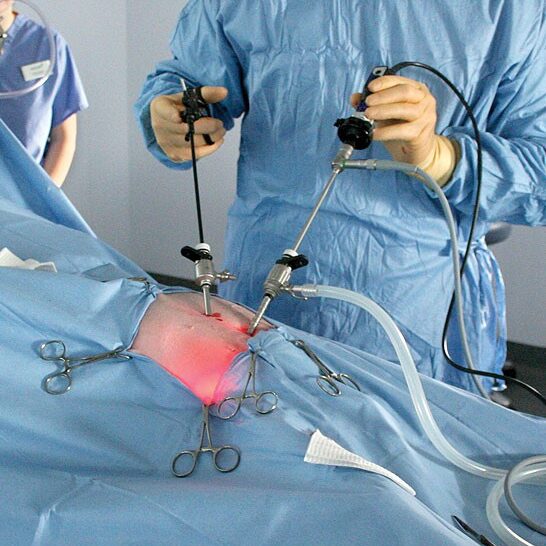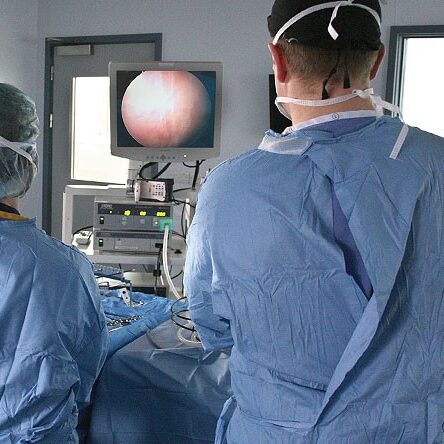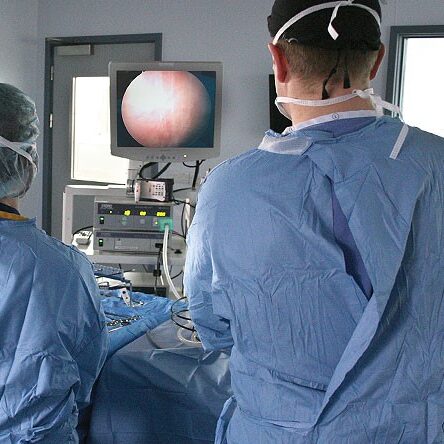Why Should I Bring my Pet to Willows for Laparoscopic Ovariectomy?
Willows is one of Europe’s leading small animal referral centres. Our state-of-the-art hospital is led by internationally renowned Specialists, committed to providing the highest standards of veterinary care. Our Soft Tissue Specialists extensive experience in performing laparoscopic ovariectomy.
Our team of Surgeons are supported by our multi-disciplinary team of Specialists across a number of disciplines including; Anaesthesia, Diagnostic Imaging and Emergency and Critical Care. Willows also has a large dedicated team of Vets, Nurses and clinical support staff available 24 hours a day, every day of the year to provide the best possible care for your pet.

What is Laparoscopy?
Laparoscopy is an endoscopic examination of the abdominal cavity (‘tummy’), either for diagnostic or treatment purposes. Procedures that are suitable for laparoscopy include; neutering, retained testicle removal, biopsy procedures, abdominal exploration, gastropexy and cystotomy.
Advantages of laparoscopy over conventional surgery include:
- Reduced pain from the surgical wounds, the pet is more comfortable post-surgery
- Two or three smaller surgical wounds
- Fewer stitches
- A faster return to normal activity, due to improved patient comfort and reduced scar tissue formation


What is a Laparoscopic Ovariectomy?
A laparoscopic ovariectomy is a ‘key-hole’ neutering/spay procedure female dogs. The procedure involves making three small five millimetre (or 2x5mm and 1x10mm in larger dogs) incisions in the skin that will normally be closed without the need for external stitches. The operation is performed on a day-patient basis and most pets do not need to stay in overnight and are re-united with their owners later the same day. The procedure involves removal of the ovaries, leaving the uterus (the womb) in place. Conventional open surgical spaying usually involves removal of the ovaries and uterus together (ovario-hysterectomy). The key-hole ovariectomy operation is quicker, less invasive and less painful than the conventional spay procedure. There is no evidence that leaving the uterus behind results in any increased risk of incontinence or womb infection in the future when compared to conventional surgery.s, eget sodales eros blandit nec. Pellentesque non nibh vel urna porttitor bibendum nec eu nibh.

Pets having a laparoscopic spay should be starved from 10pm the night before surgery with free access to water the time of admission to the hospital. The surgery is normally performed in the morning, and on the day of the procedure you will need to book an early appointment (8.45am Mon – Thurs and 8am on a Fri) to see the Vet who will be performing the surgery. Your pet should be able to go home in the afternoon/evening, usually between 4 and 6pm. These procedures are performed on certain days of the week, but not every day.
Those patients referred from other practices need to come with a full medical history from your vet and a letter from your vet stating that they are in agreement with the referral for neutering. At the time of discharge you will receive a detailed post-operative care sheet, and your vet will be sent information regarding your pet’s procedure and post-operative care requirements. .
A visit to your vet is generally recommended two to three days after the procedure in order to check your dog or progress.
As with humans undergoing laparoscopic surgery, we do ask that we are given permission to convert to a more conventional approach during the procedure if necessary. This is only required in the unlikely event that unforeseen circumstances arise which result in the risks to your pet being reduced by converting to conventional surgery.
What can I Expect if my Pet is Treated for a Laparoscopic Ovariectomy?
If your bitch is coming to us for a laparoscopic spay, she should be starved from 10pm the night before surgery but can have water freely available until the time of admission to the hospital. The surgery is normally performed in the morning, and on the day of the procedure you will need to book an early appointment (8.45am) to see the specialist who will be performing the surgery. Your pet should be able to go home in the afternoon/evening, usually between 4 and 6pm. These procedures are performed on certain days of the week, but not every day.
Those patients referred from other practices need to come with a full medical history from your vet and a letter or fax from your vet stating that they agree with the referral for neutering. At the time of discharge, you will receive a detailed post-operative care sheet (see below), and your vet will be sent information regarding your pet’s procedure and post-operative care requirements. A visit to your vet is generally recommended 2 to 3 days after the procedure to check your dog or cat’s progress.
As with humans undergoing laparoscopic surgery, we do ask that we are given permission to convert to a more conventional approach during the procedure if necessary. This is only required in the unlikely event that unforeseen circumstances arise which result in the risks to your pet being reduced by converting to conventional surgery.
To save this page as a PDF, click the button and make sure “Save as PDF” is selected.
Soft Tissue Surgery
Find out more
To assist owners in understanding more about Soft Tissue Surgery we have put together a range of information sheets to talk you through the some of the more common soft tissue conditions seen and treated by our Specialists.
Condition:
Treatment:

